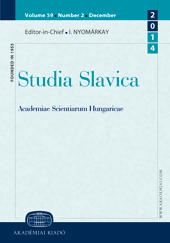A Slavonic etymology of Hung. ocsúdik ‘to come to, to awake’ and the question of the morphological adaptation of Slavonic loan verbs in Hungarian
A Slavonic etymology of Hung. ocsúdik ‘to come to, to awake’ and the question of the morphological adaptation of Slavonic loan verbs in Hungarian
Author(s): Michał NémethSubject(s): Morphology, Comparative Linguistics, Finno-Ugrian studies, Eastern Slavic Languages, Philology
Published by: Akadémiai Kiadó
Keywords: etymology; Hungarian; Slavonic languages; morphological adaptation; loan verbs;
Summary/Abstract: The two Turkic etymologies of Hung. ocsúdik (1508) ‘to awake, to come to, to regain consciousness’ proposed, on the one hand, in the late 19th century by Vámbéry (1870) and, on the other, by K. Palló in 1976 and 1982, have been rightly rejected by the authors of TLH. At the same time, the explanation for the origin of this word found in the etymological dictionaries of Hungarian (TESz, EWUng, Zaicz 2006), namely, that it is a derivative of an unknown unproductive stem, is not entirely convincing for morphological reasons. The present paper offers a new etymology for this word, explaining it as a loanword from East Slavonic очюдитися ‘to regain consciousness, to awake’ attested in 16th- and 17th-century Russian. The starting point for the discussion is M. Stachowski’s (2014) article, in which he compared Hung. ocsúdik with Polish dialectal ocudzić ‘to revive’.
Journal: Studia Slavica Academiae Scientiarum Hungaricae
- Issue Year: 60/2015
- Issue No: 1
- Page Range: 33-41
- Page Count: 9
- Language: English
- Content File-PDF

